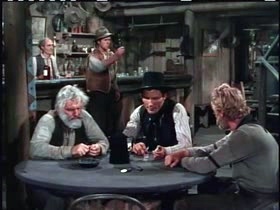THE American WESTERN
By Jeffrey-Baptiste Tarlofsky
By Jeffrey-Baptiste Tarlofsky
Lesson 19 consists of 7 video lectures and transcripts of those lectures, and 6 film excerpts. Start with the lecture, Part 1 and continue down the page in sequence until you reach the end of the lesson.
レッスン19は、7本のビデオレクチャー(レクチャーのテキストがビデオレクチャーの下に記載されています)と6本の動画で構成されています。
このレッスンは、最初のLecture Part 1から順番に動画を見たりテキストを読んでください。
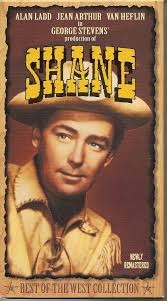
Directed & Produced by: George Stevens
Screenplay by: A.B. Guthrie Jr and Jack Sher
Based on: Shane 1949 novel by Jack Schaefer
Starring: Alan Ladd, Jean Arthur, Van Heflin, Brandon deWilde, Jack Palance
Music by: Victor Young
Cinematography: Loyal Griggs
Running time: 118 minutes
Part 1 – I asked you in the previous lecture to consider three questions: why does Shane stay in the valley, why does he take his gun off, and what does the tree stump symbolize? I will answer the first two questions now but save the third for our next lecture. I do hope you thought of your answers. Please compare them to mine.
It seems Shane sees the Starrett’s offer of a job and a place to live as a chance to give up his life as a gunfighter and to return to normal life. This was what Jimmy Ringo dreamed of doing in The Gunfighter. Of course, Jimmy Ringo had additional reasons for wanting to return to a normal life. He was both a husband and a father. Well…that isn’t quite true. He was married to Peggy and they had a child together, but Jimmy Ringo left them long ago to continue his life as a gunfighter. He was not a husband to his wife, nor a father to his son because he has been gone for many years. Suddenly he reappears and wants to see them. This was why his friend, the Marshal, asked “Do you think she wants to see you?”.
He left them so long ago that his own son has absolutely no memory of him. Finally, his wife agrees to see him. Jimmy is exhausted by his life as a gunfighter, tired of killing and worrying about being killed. He tells her that he wants to try to rebuild his life with her and his son. But, his wife, who still loves him after all the years he has been gone, tells him the truth. It is simply too late. He is too famous. Too many people want to kill him or arrest him. Jimmy begs her for one more chance and because she still loves him, she takes pity on him because he seems so lost and lonely and afraid. She says he can come back in a year. But Jimmy doesn’t have a year. Only minutes later he is shot trying to leave the town. His wife will not allow her son to watch the father he just met die and firmly drags the protesting boy away. She knew this would be his end. Although there are many witnesses to Jimmy Ringo’s death, he dies alone in the end.
It was too late for Jimmy Ringo, but Shane might just have a chance. The Starrett family knows what he is (little Joey immediately knew he was a gunfighter and Mrs. Starrett says “I think we know” when he says “it’s a long story”). Neve the less, they accept him, welcome him without judgment. It was, after all, the Wild West, and the West was the place people went to get their “second chance”. It was almost a rule that people in the West didn’t ask about each other’s pasts because so many of them had long (unhappy) stories to tell. Westerners were focused on building their futures just as the Starretts are. They invite Shane to become part of that future. For such a violent society, the West was really a very forgiving one. Recall that the gambler, Hatfield, in Stagecoach, most probably had a shameful past in the East, but in the West, he was free to change his name and reinvent himself. At the end of Stagecoach, the outlaw and the prostitute ride off together to begin a new life together. It wasn’t too late for them to reinvent themselves.
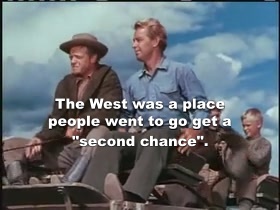
Shane is attempting to reinvent himself. It is Shane who initiates the idea by going to work on the stubborn old tree stump that Mr. Starrett has been “fighting with” for two years. he shows that he can do the simple work Mr. Starrett needs help with. The next morning Joey tells Shane that his father doesn’t want Shane “to fight his fights for him” but just hopes he will stay and work on the farm. Shane seizes the opportunity. He takes off his gun before he goes into town. He has begun trying to transform himself into a farmer. In town, he sheds his buckskins and buys simple farm worker’s clothes. This transformation is why the big Cowboy, Chris Calloway buffalos (bullies) him. He has mistaken Shane for a “sodbuster” (farmer). But putting on farmer’s clothes doesn’t make him a farmer. In the next excerpt we see that while Shane has taken off his gun, he has not abandoned his pride.
Part 2 – Again, we see the magnificence of the beautiful valley with its vast mountains and clear flowing rivers. It is Saturday and all the farmers gather to go to town together in a group. Shane goes with them. It would be a pleasant outing if it were not for the fact that they are all together because they fear the violence of the Rikers and their cowboys. As they come into the town, Morgan Riker sarcastically says of the farmers “they brought all their women to protect them”. To some extent this is true. Remember that in the old West there was a strict code of conduct to be maintained around women. Men were to tip their hats as a lady walked by and were to refrain from spitting or using bad language around women. Women, as we saw in Stagecoach, tended to bring civilization with them to the west. They were the ones to demand that churches and schools be built and they would be the customers for the stores which would supply the goods necessary to make a proper home for their families. Neither the Riker brothers nor their cowboys appear to be married or to have children, but all of the farmers have wives and children. It is the farmers and their wives who are changing the West.
We saw this in Stagecoach where John Ford depicted the Ladies of the Law and Order League as self-righteous hypocrites who persecuted Dallas and Doc. But, one could argue their self-righteousness was preferable to the lawlessness we saw in Red River when Thomas Dunson announced that he was the law and would hang the two cowboys. In other words, civilization comes with its own problems, but it is better than having no civilization at all.
Joey has drunk his soda pop and is returning the bottle to Mr. Grafton who tells him to take it into the bartender. Rather than allow Joey to go into the bar where the Rikers and the cowboys are, Shane takes the bottle back in to return it. Chris Calloway jokes with his companion that the “new sodbuster” is called “soda pop”. But the other cowboy says quietly “deal me out”, meaning that he is leaving. Calloway doesn’t have the other cowboy’s keener sense of danger. Shane may be dressed like a farmer, but the other cowboy senses something about him and says “call me superstitious”. He feels the danger around Shane and he wants no part of it
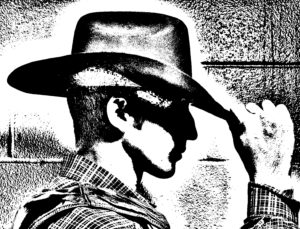
Part 3 – It is Shane who throws the first punch, which obviously surprises Calloway since he thought he could safely “buffalo” a “sod-buster”. It’s a fair fight, but Calloway, despite his size, is badly overmatched and soundly defeated by Shane. Riker, always cunning, understands that Shane “doesn’t belong on the end of a shovel” and he also realizes that with Shane working for Starrett he is likely to have a lot more trouble scaring the farmers away. He offers Shane money to leave Starrett, but when Shane turns him down, he asks, “What do you want?” In this film things often go unsaid. We know why Shane has taken off his gun and why he wants to stay in the valley. He wants a second chance at a normal life. But Shane doesn’t owe Riker an explanation for why he wants to say and answers “nothing”. Riker, slyly suggests, “pretty wife Starrett’s got“, which infuriates Shane. Is Shone angry because he is insulted by the suggestion he would look at another man’s wife…or because Riker is right and he has noticed how pretty Mrs. Starrett is and he is angry with himself for noticing? He calls Riker a “dirty, slinking old man”, giving Riker the excuse he needs to have his men attack him.
Part 4 – If the fight with Calloway was brutal but fair, the cowboy’s attack on Shane is obviously unfair. The storekeeper, Grafton, tries to put a stop to it by saying “this man is unarmed”, but the Rikers tell him “this ain’t a shooting”. It was against the law to shoot an unarmed man, but the laws on assault were much less clear. Basically, fistfights and beatings were not matters the law got involved with. Besides, as one of the farmers notes, the nearest lawman is three days ride away.
Shane is a violent film for its times and far more violent than any of the westerns we have seen so far in this class. However, the director, George Stevens, wanted the violence in Shane to disturb as well as entertain his audience. Joey witnesses both Shane’s fight against Calloway (which he clearly enjoys), but he also watches as the cowboys savagely beat Shane and runs to his father to tell him “they’re all going to kill him in there”. In the audience, we are horrified both by the level of violence and the shameless unfairness of it. Shane had stood by Starrett when he was all alone standing against six men and now Starrett has a chance to repay the debt by rescuing Shane. This “sodbuster” charges into the fight like an angry bull and proves to the cowboys that a farmer can be just as tough as any of them. Even though they are greatly outnumbered, Shane and Starrett clearly beat the Rikers and their men. Grafton says “you’ve won”. It is a humiliating defeat for Rufus Riker who tells Grafton that the next time they fight there will be “Gunsmoke”. Riker is “upping the ante”.
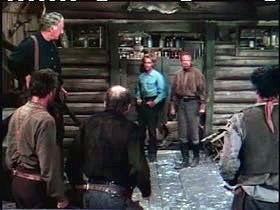
Back at the Starrett farm, Mrs. Starrett gently tends to her wounded warriors. Rather than scolding them for fighting, she tells her husband and Shane they were “wonderful”. Mrs. Starrett doesn’t like violence, but she also understands that the Rikers and their men were clearly in the wrong and she is proud of her men for standing up to them. Notice I said…”her men”.
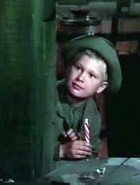
Joey is simply in heaven because, as he says, “I bet you two could whip (defeat) anyone!” Like all little boys are supposed to, he thinks his father is a mighty man, but he has also found a hero in Shane. The secret he tells his mother “I just love Shane. I love him almost as much as I love Father. That’s okay isn’t it?” is a charming, innocent, little boy thing to say…but did you notice what happens next? Mrs. Starrett opens the door to watch Shane go back to the barn where he sleeps. She watches for some time and as her husband comes out of their bedroom, she asks him, “Joe, hold me”. Again, there is something in the film that is not being said, but which we understand. What is Mrs. Starrett thinking about as she watches Shane?
Part 5 – The music again tells us who and what we are seeing. The man in black riding into town and entering Grafton’s Saloon is Wilson who is played by the wonderful actor Jack Palance. In Wilson, George Stevens and Jack Palance created one of the greatest villains of western film; a cold, cunning professional murderer who obviously enjoys his work. Everything about this man exudes danger; from his black hat, Black vest and tight black gloves to the two guns he sports on his gun belt and the cruel smile that seems to play across his face when he is amused.
Then we that the farmer, Earnie Wright, who has finally given up. The Rikers have him so frightened he is leaving the farm he and his wife and children counted on for their livelihood. I think one reason my Japanese students understand and love this film so well is that so many Japanese throughout history were just like the farmers in this film. This could be a Japanese family, hundreds of years ago. These are just good, simple, honest farmers trying to make an honest living from the land and raise their families. If they had been left alone, they would have been poor but happy. But they were not left alone. Like so many Japanese farmers throughout history, the farmers in this valley are the victims of violence. In Japan, it was the samurai fighting for rival Danshaku competing for control of the land and the rice who committed the violence. In the West, it was the cowboys fighting for the cattle barons who wanted to continue to control all the land who committed the violence. In so many ways, Shane is like a jidaigeki.
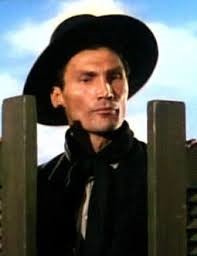
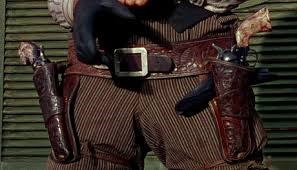
Part 6 – Joey confesses he looked at Shane’s gun and begs him for a shooting lesson. Shane hesitates at first but finally relents. I have already said that Shane is a polite and soft-spoken man and earlier in the film when he first talked to Joey he seemed to instinctively understand how to talk to children. Do you notice what he does when he is teaching Joey? It is a trick I learned when I was teaching very young children. That’s right. I wasn’t always a university professor. When I was a university student my part-time job was teaching at a nursery school with children who were from ages two to four. That was a challenging job in many ways, but my first challenge was getting those little kids to trust me and not be afraid of me. That was hard because I am rather big and sometimes little kids are scared of big people. I am 188 cm tall and 120 kilograms, so that is pretty big. so the first thing I would do when I met the children was to do exactly what Shane is doing in this scene. I would get down to their level so they could look me in the eye. That made me a lot less scary. Shane may be a gunfighter, but he has the instincts of a nursery school teacher! He teaches with great patience and kindness. He also knows the subject he is teaching. Every good teacher teaches what they know about. That is why I teach about movies. Shane teaches about gunfighting.
t isn’t quite the same thing, is it?
Joey asks Shane to shoot at something and Shane pleasantly asks, “What do you want me to shoot at?”. “The little white rock”, answers Joey, and Shane draws and shoots…three times…with unbelievable speed and accuracy. Then we see his eyes.
Wilson with his black hat and gloves is certainly frightening, but for this very brief moment we see something Shane has not shown the Starretts or any of the farmers. This is what he is like when he shoots and when he shoots it usually isn’t at little white rocks.
Mrs. Starrett reproaches Shane and tells him “guns aren’t going to be my boy’s life”. Shane replies with one of the arguments American gun owners have been using since the Constitution was written; “a gun is as good or bad as the man using it”. But Mrs. Starrett doesn’t accept that, She says, “We would all be much happier if there were no guns in the valley…including yours”. Is she telling him that she wants him to leave…or that she wishes he would give up his gun?
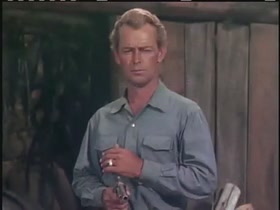
Part 7 – Torrey is a southerner. We learned this the night of the meeting with all of the farmers at Starrett’s house. Torrey was the last to arrive and as he takes off his raincoat, “Yank” Potts, who has been playing the harmonica, changes the tune to “Dixie” (which was the anthem of the Confederate States, the South, which tried to secede from the Union, thus setting off the American Civil War of 1861-1865). Playing “Dixie” is a joke about how Torrey is a quick-tempered Southerner (much like Hatfield in Stagecoach) who insists that the Confederate cause was a just and noble one (it was neither). His Southern pride (or arrogance) and his quick temper are obviously his weak points.
George Stevens got a lot of things right in Shane, but he made a few mistakes. One is that he has had the bartender, Will, pouring drinks in every scene we have seen at the saloon. This was not how it was done in the West. The bartender would give the bottle and the glass to the customer who would pour his own drink, which he was usually expected to finish in one swallow.
(I demonstrated this for you back in the Spring semester). But Stevens also quite deliberately has Torrey break one of the most fundamental and universal rules of drinking – he toasts himself! This is considered extremely bad luck in many cultures of the world. After he toasts himself, he toasts his home state of Alabama and then arrogantly strides out of the door…as the Rikers and Wilson silently watch. This is called “foreshadowing”. Foreshadowing is when a writer or director gives us a hint about events that are to come in the future of a story.
Remember that we have twice seen that Torrey is an arrogant and hot-headed Southerner. In our next lesson, we will see what Steven’s was foreshadowing.
